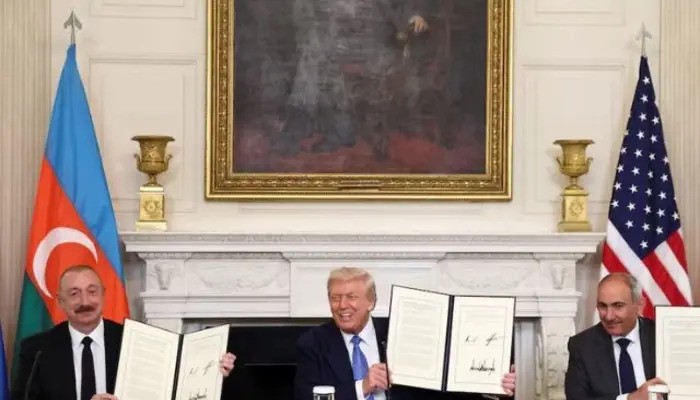Azerbaijan and Armenia have signed a South Caucasus peace deal in Washington, ending decades of hostility and opening the door to diplomatic and economic cooperation. The US-brokered agreement, announced at the White House, is seen as a breakthrough in a region long plagued by war, closed borders, and deep mistrust.
A Landmark Moment at the White House
The agreement came after a meeting hosted by US President Donald Trump, with Azerbaijani President Ilham Aliyev and Armenian Prime Minister Nikol Pashinyan in attendance. Trump hailed the deal as a decisive step toward lasting friendship, noting that the two nations had fought for 35 years but were now ready to embrace peace.
Both leaders committed to ending hostilities, establishing diplomatic relations, and respecting each other’s territorial integrity. The ceremony marked one of the most significant diplomatic achievements of Trump’s second term and is expected to unsettle Moscow, which has long viewed the South Caucasus as part of its sphere of influence.
Strategic Economic Benefits
A key element of the deal is the granting of exclusive US development rights to a strategic transit corridor through the South Caucasus. This route is designed to boost energy exports and facilitate trade across the region. The White House also revealed that the United States signed separate agreements with both nations to strengthen cooperation in energy, trade, and emerging technologies such as artificial intelligence.
Read: Trump-Modi Ceasefire Dispute Deepens Diplomatic Rift
Although details remain limited, the corridor — already dubbed the “Trump Route for International Peace and Prosperity” — has attracted interest from nine companies, including three from the United States.
A Step Toward Broader Regional Integration
US officials believe the peace agreement could pave the way for Azerbaijan’s entry into the Abraham Accords, a series of normalization pacts between Israel and several Muslim-majority countries. Defense cooperation restrictions between the United States and Azerbaijan have also been lifted, potentially altering the balance of regional security.
Both Aliyev and Pashinyan credited Trump with ending decades of conflict and pledged to nominate him for the Nobel Peace Prize.
Regional Reactions
Pakistani Prime Minister Shehbaz Sharif welcomed the deal, praising the courage and leadership of both Azerbaijan and Armenia. He also acknowledged the US role in bringing the sides together, calling it a positive development for regional stability.
The peace deal adds to Trump’s growing list of diplomatic successes in his second term, which includes brokering a ceasefire between Cambodia and Thailand, and peace agreements between Rwanda and the Democratic Republic of the Congo, and between Pakistan and India.
Decades of Conflict
The roots of the Armenia-Azerbaijan dispute stretch back to the late 1980s, when Nagorno-Karabakh, a mountainous region in Azerbaijan populated mainly by ethnic Armenians, declared independence with Armenian backing. The collapse of the Soviet Union in 1991 left the territory in a state of de facto independence for decades.
Azerbaijan regained full control of Nagorno-Karabakh in 2023, leading almost all of its 100,000 ethnic Armenians to flee to Armenia. This shift in territorial control created a fragile calm but left deep grievances on both sides.
Implications for Russia
The deal sidelines Russia, which has traditionally played the role of mediator in the South Caucasus. Experts warn that Moscow may react strongly to being excluded from negotiations and infrastructure plans.
Tina Dolbaia, an associate fellow at the Center for Strategic and International Studies, noted that US involvement in the transit corridor is a “huge” geopolitical shift. Similarly, sanctions expert Brett Erickson pointed out that the agreement could help the West close loopholes that Russia uses to evade sanctions.
Expert Opinions and Caution
While the signing is celebrated as a major breakthrough, analysts caution that peace in the region has a fragile history. Olesya Vartanyan, an independent regional expert, said the deal offers predictability but stressed the need for sustained US engagement to prevent a return to violence.
The agreement also has human rights dimensions. Washington-based rights group Freedom Now urged the Trump administration to push for the release of 375 political prisoners in Azerbaijan. Baku, however, rejects such criticism, calling it foreign interference.
A New Chapter for the South Caucasus
If the commitments hold, the South Caucasus could see open borders, stronger economies, and new trade routes linking Europe and Asia. The peace deal sends a clear signal to other conflict-prone regions that even long-standing hostilities can be resolved through sustained diplomacy and international mediation.
Follow us on Instagram, YouTube, Facebook,, X and TikTok for latest updates
